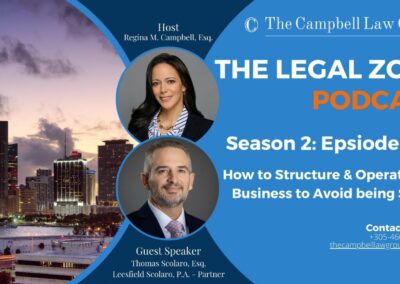Tortious interference with a contractual relationship can cause untold damages to businesses and sometimes go completely unnoticed until the situation is dire. If you feel that your business may be a victim of tortious interference, having a seasoned, experienced attorney on your side can make all the difference in whether you are able to litigate successfully.
Certain key elements must be demonstrated for tortious interference with a contractual business relationship. Generally, you must be able to show the existence of a contractual relationship that the tortfeasor had knowledge of. The tortfeasor must intentionally and without justification cause a breach or disruption in the contractual relationship. Finally, the tortfeasor’s actions in causing the breach or disruption must have resulted in damage to your business. Usually, the tortfeasor’s tortious interference must be intentional rather than negligent in order for you to collect damages and must include some sort of wrongful act and/or improper use or access of confidential information in which a tortfeasor uses to interfere with your contractual relationship.
A common example of tortious interference with a contractual relationship is when a third party convinces or coerces a supplier into ending or limiting a contract and thus no longer servicing a competing company or servicing that company on a restricted basis. But not all tortious interference cases involve a contract. Third parties may commit tortious interference with a prospective economic advantage by interfering with business dealings before they are ever put on paper.
What constitutes tortious interference is largely based on each state’s tort laws and statutes as well as what each court has ruled on in past cases. Florida has a fairly robust history of awarding parties injured by a tortfeasor though each case must be decided on its own merits. Where many business owners err is to assume that Florida courts will agree with the intentional conduct of the tortfeasor and simply see the behavior as “competition”. Tortious interference with a contractual relationship is a cause of action in Florida and Courts recognize economic injury resulting from a tortfeasor’s actions when merited.
None of these are a given and should be taken for granted. To litigate successfully in tortious interference cases, attorneys for the plaintiff must present a rock-solid, compelling case that leaves nothing to chance.
As with all litigation, it is essential that you first consult with an experienced attorney to ensure you have cause and enough evidence to pursue your case. Our South Florida-based firm has ample experience in dealing with tortious interference cases and can represent your business or serve as litigation general counsel.
The Campbell Law Group: Expert Legal Representation for Tortious Interference Cases
If you want to pursue cases of tortious interference, it is crucial to consult an attorney who has specialized knowledge in complex business legal matters and litigation. Ideally, the attorney should have a strong grasp of business dynamics and a financial background. At the Campbell Law Group, we specialize in complex business litigation and have extensive experience litigating cases with cross-border implications and jurisdictional issues.
Our firm proudly represents clients across South Florida, including but not limited to Miami Beach, Coral Gables, Coconut Grove, South Miami, Pinecrest, Brickell, Edgewater, Doral, and Wynwood. We also handle cases in Broward and Palm Beach County, as well as in Tampa, Orlando, and throughout Florida. To learn more about how our firm can assist you, please don’t hesitate to reach out to us.
Frequently Asked Questions
What elements must be present for a claim of tortious interference with a contractual relationship in Florida?
To establish a claim of tortious interference with a contractual relationship in Florida, the following elements must typically be present:
- Existence of a valid contract: The plaintiff must show that a valid contract existed between them and another party.
- Knowledge of the contract: The defendant must have known about the existence of the contract.
- Intent to interfere: The defendant must have intended to interfere with the plaintiff’s contractual relationship.
- Improper interference: The defendant’s actions must have been improper or wrongful, such as inducing the other party to breach the contract, using fraud or coercion to prevent performance of the contract, or otherwise disrupting the contractual relationship.
- Causation: The defendant’s actions must have caused the plaintiff to suffer damages, such as financial loss or other harm.
- Damages: The plaintiff must have suffered actual damages as a result of the interference.
Who can be held liable for tortious interference with a contractual relationship in Florida?
In Florida, any third party who intentionally interferes with a contractual relationship between two parties may be held liable for tortious interference. This can include individuals, businesses, or even government entities. However, it is important to note that not all interference is considered tortious, and there must be evidence of intentional interference that resulted in damages to the party with the contractual relationship.
What defenses can be raised against a claim of tortious interference with a contractual relationship?
Several defenses can be raised against a claim of tortious interference with a contractual relationship in Florida. These defenses include:
- Justification: The defendant may argue that they had a legitimate reason for interfering with the contract, such as protecting their own interests or preventing illegal or unethical conduct.
- Privilege: The defendant may argue that they had a privileged relationship with one of the parties to the contract, such as an attorney-client relationship, and that their actions were protected by that privilege.
- Lack of Intent: The defendant may argue that they did not intend to interfere with the contract but rather acted in good faith or made a mistake.
- Statute of Limitations: The plaintiff may have waited too long to bring the claim, and the defendant may argue that the claim is barred by the statute of limitations.
It is important to note that the availability and success of these defenses will depend on the specific facts of the case and the arguments made by both parties. It is recommended that anyone facing a claim of tortious interference with a contractual relationship consult with an experienced attorney to determine their best course of action.
What damages can be sought in tortious interference with a contractual relationship claim?
Damages that can be sought in tortious interference with a contractual relationship claim in Florida include compensatory damages, which may cover the financial losses suffered by the plaintiff due to the interference. These losses could include lost profits or costs incurred as a result of the interference. Additionally, the plaintiff may seek punitive damages intended to punish the interfering party for their actions and deter similar conduct in the future.






